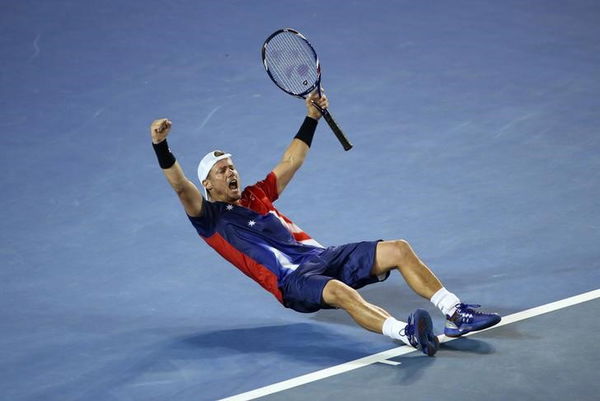
via Reuters
Australia’s Lleyton Hewitt celebrates after winning his first round match against compatriot James Duckworth at the Australian Open tennis tournament at Melbourne Park, Australia, January 19, 2016. REUTERS/Jason O’Brien

via Reuters
Australia’s Lleyton Hewitt celebrates after winning his first round match against compatriot James Duckworth at the Australian Open tennis tournament at Melbourne Park, Australia, January 19, 2016. REUTERS/Jason O’Brien
MELBOURNE (Reuters) – An emotional Lleyton Hewitt staved off retirement for at least one more match by beating countryman James Duckworth 7-6(5) 6-2 6-4 to reach the second round of the Australian Open on Tuesday.
The hard-bitten 34-year-old, making a record 20th and final Australian Open
appearance at his home grand slam, soaked up the atmosphere under the Rod Laver Arena lights and celebrated wildly after sealing the win in two hours and 23 minutes.
ADVERTISEMENT
Article continues below this ad
“It was a tough situation absolutely to try and block out everything else that’s been going on,” the two-times grand slam champion, who last year announced he would end his career after the Melbourne tournament, said in a courtside interview.
“It’s not like the final round of a football season.
“I think I blocked it out pretty well.”
The match was awkward for Hewitt, who had been giving grand slam tips to his 129th-ranked opponent the day before the draw was released.
With his wife and children watching from the player’s box and a roll-call of local celebrities in the crowd, Hewitt began tentatively but gradually loosened up to dictate play against the big-serving Duckworth.
He roared his first trademark “come on!” after scrambling to lace a passing shot at 3-2 in the opening set and from there his game flowed freely.
Famous for grinding through five-set marathons, Hewitt wobbled in the third set to fall behind 4-2 but notched four straight games to seal the win, sparking thunderous cheers from the terraces.
He flopped on court and roared into the night sky, having set up a second round match with eighth seed David Ferrer, another baseline hustler.
ADVERTISEMENT
Article continues below this ad
“Ferrer’s a totally different customer. I have so much respect for his game and the way he goes about it,” said former world number one Hewitt, appearing at his 66th grand slam.
“It’s going to be a real battle.”
Another centre court appearance is certain for Hewitt, who has shouldered the burden of expectations from home crowds for nearly two decades.
ADVERTISEMENT
Article continues below this ad
“This is what I’m going to miss the most, the buzz from the crowd,” he said.
(Editing by Martyn Herman)

